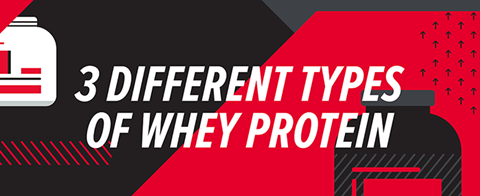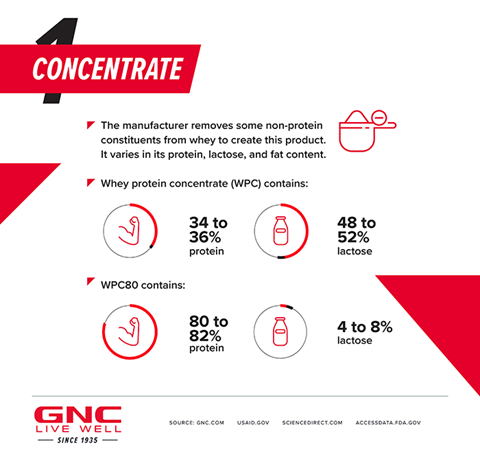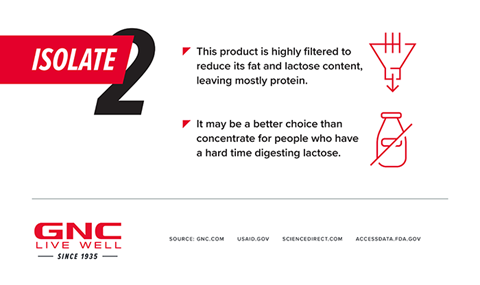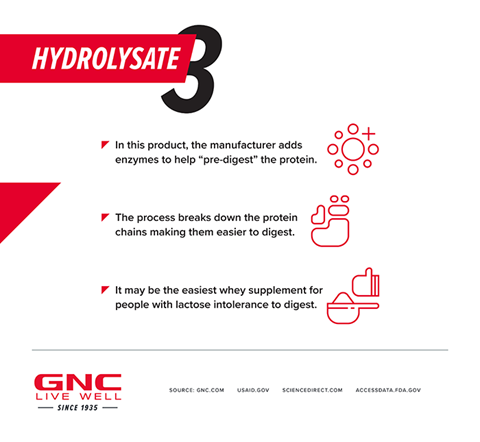Share With Others!
Does whey protein make you gain weight? It’s a question frequently asked by people on a fitness and weight-loss journey. After all, if you’re trying to become stronger, leaner, and healthier, the last thing you want is to use a supplement that negates your hard efforts in the gym, right?
Even though some individuals steer clear of whey protein because they’re afraid of weight gain, a review of more than 20 randomized control trials shows that whey protein is a safe, effective supplement that athletes can use to enhance their physical performance, stamina, and recovery. That being said, there are some nuances in the world of whey, so let’s take a closer look at whey protein myths and facts to make sure you’re using the supplement that’s best for you.
Read More: Complete Guide To Whey Protein
Weight-Related Myths About Whey Protein
Whether you’re looking to lose weight, build muscle, or take your overall fitness to the next level, you may have considered incorporating whey protein into your diet with shakes, smoothies, or other recipes. After all, research suggests bumping up your daily protein intake is an effective step toward reducing fat when combined with exercise. If you’ve debated whether whey protein’s the right supplement to help you achieve your goals, the following facts should help put your mind at ease — or at least help you make an informed decision.
Myth: Whey protein will make you gain weight
The facts: Let’s break down this idea. Why do we generally gain weight? In most cases, unless you have a medical or other issue, weight gain is the result of consuming more calories than we burn regularly. And we typically do that because we’re hungry.
Good news! Protein, including whey protein, combats hunger by stimulating the production of hunger-reducing hormones, like peptide tyrosine-tyrosine (PYY) and glucagon-like peptide 1 (GLP1). And it doesn’t stop there. It also causes decreased levels of the appetite-stimulating hormone ghrelin. Talk about a win-win!
So why has whey protein gotten a reputation for weight gain? Why are people still asking, “Does whey protein make you fat?” The answer likely has to do with actual weight versus body composition. Lean muscle weighs more than fat per volume of measurement, and protein helps you gain lean muscle mass. As you build muscle, the number on the scale may stay the same — or even increase, in some cases — but weight is not the most accurate indicator of what’s happening in your body.
Muscle may weigh more than fat, but muscle makes you look leaner and more toned. Rather than solely relying on your scale, look at the mirror, the fit of your clothes, or even a tape measure to see the real difference. And you can also look to science! A 2019 systematic review of studies on whey protein supplementation showed that incorporating whey protein had a significant impact on reducing the waist circumference of overweight and obese individuals.
Myth: Women shouldn’t use whey protein because it will make them gain weight
The facts: The majority of studies on whey protein have focused on men, but a 2018 review of 13 studies turned the focus to the female population. This review found that while whey protein helped to increase lean muscle mass, it didn’t influence any changes in fat mass. Those studies also showed that whey protein had the biggest effect on lean mass in women when paired with energy restriction, which is a dietary plan that reduces your food intake. However, surprisingly, when the participants incorporated resistance training, those benefits disappeared.
So, if you’re wondering if whey protein makes you fat if you don’t work out, the answer is no! Strangely enough, the studies show that taking whey protein and restricting calories while not working out may help women increase their muscle mass. Plus, whey protein was not shown to increase fat for women.
Myth: Whey protein contains steroids
The facts: As a general rule, it’s wise to do your research on any supplement you take, including whey protein. Refer to the product label of any supplement to check for warnings associated with the product before you take it.
Whey protein does not contain steroids. However, a regulatory review officer at the Federal Drug Administration (FDA) found that some unapproved bodybuilding supplements do contain steroids or steroid-like substances. Dietary supplements sold in fitness equipment shops in the United Kingdom were also found to contain anabolic steroids that differed from the ingredients on the labels.
These findings were not specific to whey protein, although the products in question were often labeled as dietary supplements, making them sound far safer than they were. If you’re taking any supplements that make claims about including steroids or steroid-like ingredients, the FDA recommends you stop and speak to your health care professional.
The bottom line? Whey is a byproduct of the cheese-making process. Specifically, it comes from the watery portion of milk separated from curds. In its purest form, whey protein contains no steroids, but be sure to buy supplements from a reputable brand and carefully read the labels to understand the ingredients.




Myth: Whey protein causes bloating
The facts: Bloating is never a good time — and figuring out what’s causing bloating may be even less fun. Food intolerance, a digestive issue, or even hormones can all cause stomach bloating.
When it comes to whey protein, those who don’t tolerate dairy products may be wary of taking the supplement. After all, whey comes from the cheese-making process, so technically, it’s dairy.
However, you may not have to give up your favorite whey protein, even if you have a dairy intolerance! You can take several steps to reduce your digestive issues.
- Increase your fiber. Add more whole grains and fresh whole fruits and veggies, along with nuts and legumes to naturally up your fiber intake. However, take it slow! While fiber helps to break protein down, which can help reduce bloating caused by whey protein, too much fiber can lead to more gas.
- Get a little picky. Not all whey proteins are equal, and hydrolyzed or isolate whey protein can be easier on the digestive tract than concentrate. Isolate and concentrate are the most common forms found in supplements, and the difference is in how they’re processed. Isolate whey protein undergoes more processing (which leaves it with less lactose and fat than concentrate). Hydrolyzed whey protein goes through a separate process that essentially semi-digests it, making it the easiest for someone with an intolerance to digest.
- Take it slow. Not only will sipping your drink slowly help you approach your snack more mindfully but drinking slowly also reduces the amount of extra air you take in when you gulp. When you swallow less extra air, you’ll have less excess gas in your belly.
- Mix it up. Sometimes it’s more about what you can add versus what you need to reduce, so try mixing some tasty spices known to relieve excess gas into your supplement, like ginger or turmeric.
Conclusion
It’s always fair — in fact, it’s smart — to ask questions about supplements you’re interested in taking. Will whey protein burn fat? Does whey protein turn into fat? Does whey protein reduce belly fat? These are all questions people ask. On its own, whey protein doesn’t do any of these things. But the right whey protein supplement, used in conjunction with a healthy diet, training program, or both, could help you reach your fitness goals. When in doubt, do your research and talk to your health care professional to determine whether whey protein is right for you.

